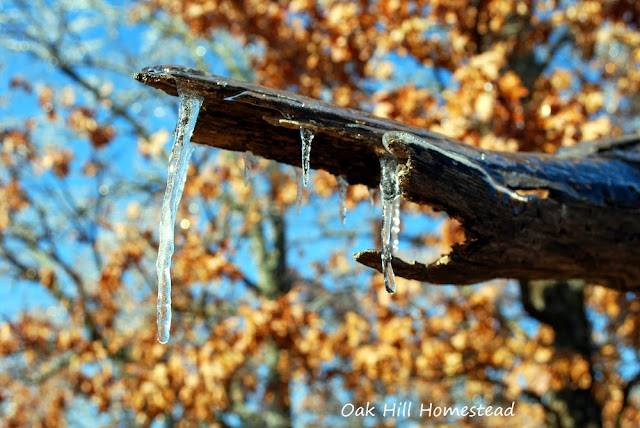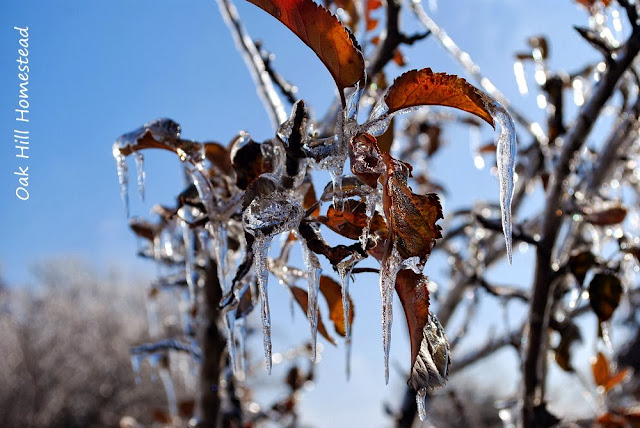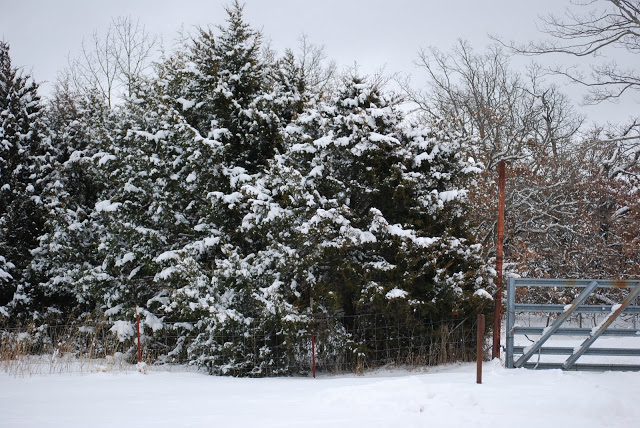Be ready before winter storms hit with these essential homestead preparations. Having emergency supplies on hand, knowing what last-minute steps to take, and learning from past experiences will help you face winter weather with confidence.
Preparing for winter storms on the homestead
We have snow in the forecast this week. Yes, even here in Oklahoma we have an occasional snowstorm. We've had a few big blizzards over the years, and ice storms are a given.
These suggestions will help you prepare for winter storms on your homestead.
This post was updated in February 2025
Ice storms are more likely to interrupt our electric service than a snowstorm, so we prepare for ice storms as well as snowy weather.
Heavy ice weighs down the electric wires and cause them to sway in the high winds, often causing them to break and fall.
We've been without power for days at a time in the past but we weathered it well because we were stocked up with food and supplies.
How to prepare for winter storms
You'll find suggestions and tips on keeping your home warm in cold weather here.
Both snow and ice have an impact on our homestead though. We have livestock to keep warm and fed.
So when there's a storm in the forecast, I go into super-preparedness mode.
This post contains affiliate links. If you click on a link and make a subsequent purchase, I might receive a small commission at no cost to you. Read my disclosure here.
Stock up on food and water ahead of time
We always have food and water on hand, but if there are any immediate needs we head to town long before the day the weather will hit.
If you wait until the last minute you're likely to find empty shelves when you get to the store.
Ready.gov recommends having a minimum of one gallon of water per person per day on hand at all times, for both drinking and sanitation purposes.
I suggest having more, and here's why: Why You Should Be Storing Water
If you have a well, it won't pump water if the electricity goes out. It's a good idea to have extra water on hand to flush toilets.
If you don't have enough water in storage, you can fill up the bathtub before the storm hits. This water can be used for sanitation, cleaning and toilet-flushing.
Make a list and stock up on necessities you might need before the storm hits. While you're in town, top off your gas tank.
Don't wait until right before the weather is due - everyone else is going to stock up too, and you'll find bare shelves if you wait.
For more homesteading and do-it-yourself posts, subscribe to The Acorn, Oak Hill Homestead's weekly-ish newsletter (you'll get my ebook How to Make Vinegar for Pennies for FREE).
Stock up on pet and livestock feed
Likewise, don't wait until the last minute to buy another bag of feed for the goats, or dog and cat food.
We keep at least two week's worth of pet and livestock feed on hand at all times.
Your livestock will need unfrozen water to drink during the storm, just like you do. Keep an axe or hatchet in an accessible place to use to chop ice. You can find some additional ideas (both electric and non-electric) for keeping livestock water from freezing here.
Your emergency binder
A well-stocked pantry and emergency supplies are essential for riding out a winter storm, but being truly prepared also means having important information at your fingertips.
If an emergency arises or your homestead suffers damage from a storm, you don’t want to be searching for insurance policies, emergency contacts, or medical records. That’s where the SafeHarbor Emergency Binder System comes in: it keeps all of your critical documents organized and easy to access when you need them most.
Don't wait until the last minute to gather these details. An up-to-date emergency binder can save you stress and time in the middle of a storm.
Before the storm, make sure you have these emergency storm supplies on hand
- enough food to last at least a week - more is better! Hopefully you have more than that stocked away, no matter what time of year it is.
- livestock feed
- dog and/or cat food
- bottled water
- batteries for flashlights and weather radio
- an alternate heat source
- fuel for your heat source and generator
- lamp oil if you have oil lamps
- headlamp flashlights for hands-free chores in the dark
- candles and matches
- firewood if you have a wood stove or fireplace
- Sun Kettle solar water heater - ours was a blessing when our power was out after the tornado hit our neighborhood. It truly does heat up water FAST, and HOT.
At home, do the following:
- Move hay and feed to a dry place that's easy to access during storms, but out of reach of your livestock.
- Move snow shovels inside the garage or mudroom where you can reach them easily.
- Gather water containers that you can use to haul water to livestock if needed. Keep them indoors or in the garage.
- Fill containers (such as empty canning jars and cleaned-out juice or soda bottles) with water for drinking.
- Gather the components for a straw box cooker and store them in the house or garage.
- Locate the camp stove if you have one, alternate heating sources such as propane heater, and check your supply of propane bottles.
- Provide fresh, clean bedding for animals and poultry.
- Fill feeders and water troughs.
- I stash a mallet, axe or hammer under the horses' water trough so I can break the ice if my electric tank heater isn't working. Place it under the trough or in another convenient place that will keep it from being buried in the snow.
Before the storm hits
- Cook something! I like to put a hearty meal in the crockpot, and bake bread before the storm hits.
- Do the dishes and laundry. If the power goes out, you'll have clean dishes and clothes.
- Charge your cell phones
- Charge up an external power bank for your phone. I love my solar phone charger!
- Keep your weather radio, flashlights, candles and matches, and other items in a convenient place.
I keep a notebook and pen handy so that I can journal about the storm, what we did, what worked and what didn't, and what I've learned from the storm.
(Read about one particularly fierce ice storm and power outage and how we managed to get through it in Our Ice Storm Journal.)
I reread my notes each winter when storms are in the forecast.
For instance, I've learned from experience that I need to go out several times during a storm to shovel snow away from gates. I can't swing open the gates and tend to the livestock if the snow is deep. I had to climb fences after one big storm!
It's okay - you can laugh if you live in snow country. We don't have epic storms every year - or any snow at all some years - so it's easy to forget what impact a blizzard or an ice storm has on our homestead. My notes keep me from being taken by surprise.
What do you do to prepare before a winter storm hits?


















